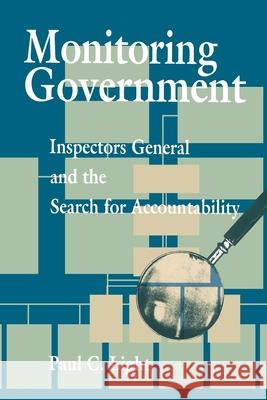Monitoring Government: Inspectors General and the Search for Accountability » książka
Monitoring Government: Inspectors General and the Search for Accountability
ISBN-13: 9780815752554 / Angielski / Miękka / 1993 / 268 str.
Monitoring Government: Inspectors General and the Search for Accountability
ISBN-13: 9780815752554 / Angielski / Miękka / 1993 / 268 str.
(netto: 97,55 VAT: 5%)
Najniższa cena z 30 dni: 101,59
ok. 30 dni roboczych
Bez gwarancji dostawy przed świętami
Darmowa dostawa!
Until the Department of Housing and Urban Development scandal in 1989, the public knew little about federal inspectors general (IGs). Suddenly, Congress, the press, and the public were seeking answers to a scandal that challenged the role of the IGs in ensuring government accountability. Within days, the IGs were front-page news, and greater emphasis was placed on fraud, waste, and abuse as a measure of whether government could be held accountable. Monitoring Government offers the first systematic evaluation of the offices of inspector general OIGs and examines the government-wide investment in the IG concept. Despite their increasingly prominent, often controversial, role in the internal oversight of government, very little is known about their institutional or operational problems. To some in the executive branch, OIGs exercise too much discretion at the expense of executive control. To others in Congress, they do not have enough autonomy and responsibility. Overall the question is not only how the OIGs have functioned, but also what role they soundly play in our system of separation of powers. Paul Light begins with a brief history of the IG concept, from the passage of the 1978 IG Act to the changes in mission with new administrations. He explains the different approaches to accountability, discusses the nature of monitoring the political incentives surrounding findings and recommendations made by IGs, and looks at the dominance of compliance monitoring as the front line against fraud, waste, and abuse. The book addresses a number of specific issues regarding the policing of government. Using detailed interviews with past IGs and senior-level officials across government, as well asa case study of the Housing and Urban Development scandal, Lights examines a series of specific operational issues. Envisioning a broader role for the IG in the future, he offers recommendations to strengthen the search for accountability.











